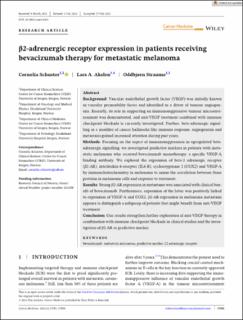β2-adrenergic receptor expression in patients receiving bevacizumab therapy for metastatic melanoma
Journal article, Peer reviewed
Published version

Åpne
Permanent lenke
https://hdl.handle.net/11250/3108651Utgivelsesdato
2023Metadata
Vis full innførselSamlinger
- Department of Clinical Science [2318]
- Registrations from Cristin [9791]
Sammendrag
Background
Vascular endothelial growth factor (VEGF) was initially known as vascular permeability factor and identified as a driver of tumour angiogenesis. Recently, its role in supporting an immunosuppressive tumour microenvironment was demonstrated, and anti-VEGF treatment combined with immune checkpoint blockade is currently investigated. Further, beta-adrenergic signalling as a modifier of cancer hallmarks like immune response, angiogenesis and metastasis gained increased attention during past years.
Methods
Focusing on the aspect of immunosuppression in upregulated beta-adrenergic signalling, we investigated predictive markers in patients with metastatic melanoma who received bevacizumab monotherapy, a specific VEGF-A binding antibody. We explored the expression of beta-2 adrenergic receptor (β2-AR), interleukin 6-receptor (IL6-R), cyclooxygenase 2 (COX2) and VEGF-A by immunohistochemistry in melanoma to assess the correlation between these proteins in melanoma cells and response to treatment.
Results
Strong β2-AR expression in metastases was associated with clinical benefit of bevacizumab. Furthermore, expression of the latter was positively linked to expression of VEGF-A and COX2. β2-AR expression in melanoma metastasis appears to distinguish a subgroup of patients that might benefit from anti-VEGF treatment.
Conclusion
Our results strengthen further exploration of anti-VEGF therapy in combination with immune checkpoint blockade in clinical studies and the investigation of β2-AR as predictive marker.
